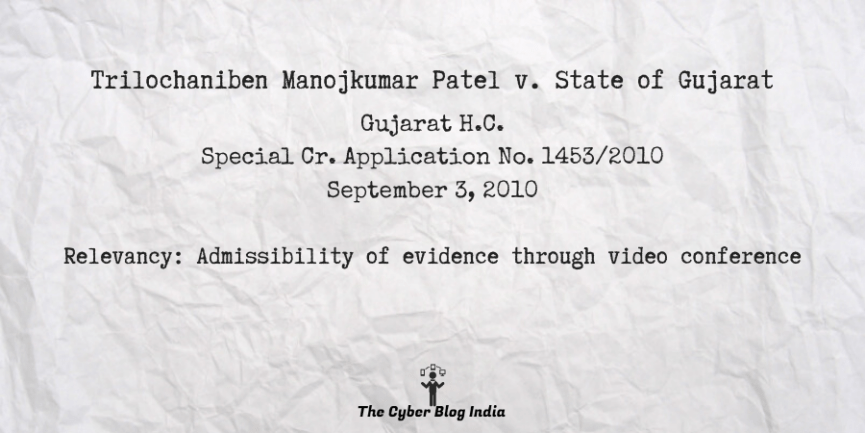Trilochaniben Manojkumar Patel v. State of Gujarat

Trilochaniben Manojkumar Patel v. State of Gujarat
In the High Court of Gujarat
Special Cr. Application No. 1453/2010
Before Justice Akil Kureshi
Decided on September 3, 2010
Relevancy of the case: Admissibility of evidence through video conference
Statutes & Provisions Involved
- The Information Technology Act, 2000 (Section 65, 66, 67)
- The Indian Penal Code, 1860 (Section 120(B), 376, 387, 388)
Relevant Facts of the Case
- The petitioner had filed a complaint on behalf of her daughter who was the victim, on 29 April 2009, alleging offences punishable under Section 366, 376, 387, 388 and 120B of the IPC, as well as offences punishable under Section 65, 66 and 67 of the Information Technology Act, 2000.
- Investigations were carried out, and the case went for trial in the Sessions Court where it was prayed by the petitioner that the court shall allow the order of issuance of commission to record evidence through video conferencing.
- The trial judge rejected her application and thus the petitioner has filed for an appeal in the High Court.
Prominent Arguments by the Advocates
Shri Hriday Buch, Counsel on behalf of the Petitioner:
- The learned counsel who appeared for the petitioner drew attention to various documents on record and contended that the daughter of the petitioner (the victim) had migrated to Australia with her sister and brother-in-law to pursue her studies. She was to return to India which eventually got cancelled because of the unexpected All India Bandh took place. Now, it is nearly impossible for them to revisit India for the deposition since it could create considerable delay and expenses.
Shri Tejas Barot, Counsel on behalf of the Respondents:
- The petition was opposed by contending that the victim girl was very much in India previously. No sincere attempt was made to have her deposition recorded. The court has thus committed no error in rejecting the application.
Opinion of the Bench
- The court after perusal of all the documents presented came to the view that this case should be brought to end as early as possible through a speedy trial.
- Reliance was placed on the decision of the Supreme Court to allow evidence to be recorded through video conferencing in State of Maharashtra v. Dr Praful B. Desai. The fact that to secure the presence of the victim, her sister, and brother-in-law would entail considerable expense, was considered and the High Court permitted the recording of evidence through video conferencing.
- The court directed to conduct the trial on day to day basis by approving the application of the petitioner who prayed to conduct the video conference for collecting evidence by considering this as an exceptional case.
- There were two aspects to be noted, firstly the modalities for providing such facilities and secondly, the necessary safeguards which should be provided.
Final Decision
- The petitioner shall deposit ad-hoc cost of Rs. 5000 with the Registry to be adjusted upon the availability of accounts.
- A suitable amount shall be deposited, if indicated by the Consulate General in Sydney, if the exercise was likely to lead to considerable expenses.
- Hence, the petition was disposed of.
This case summary has been prepared by Akshara Kamath, an undergraduate student at Symbiosis Law School, Hyderabad, during her internship with The Cyber Blog India in June/July 2020.
